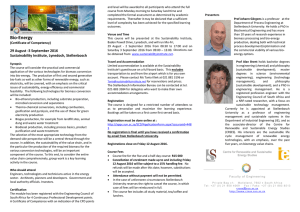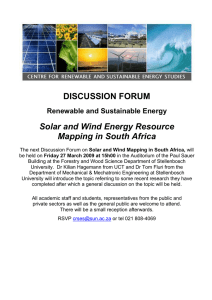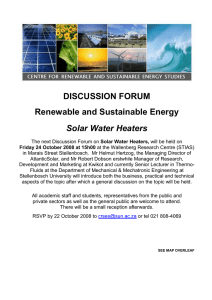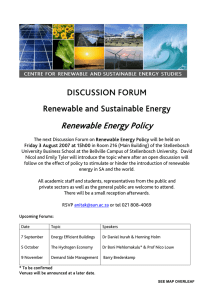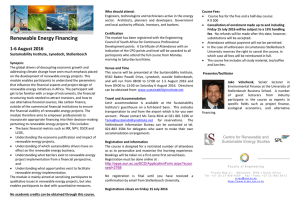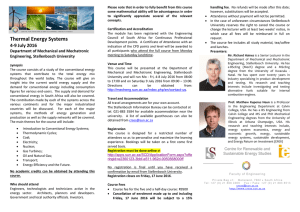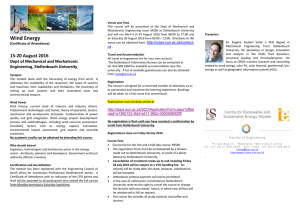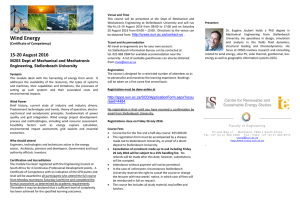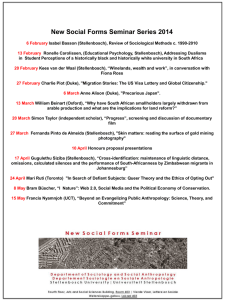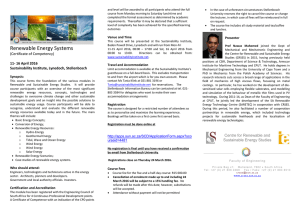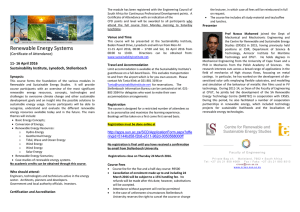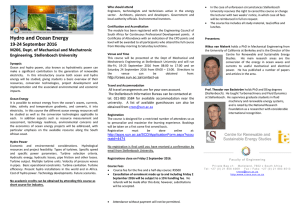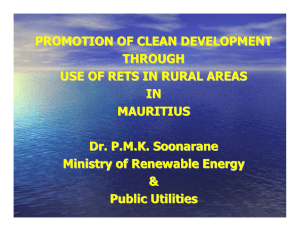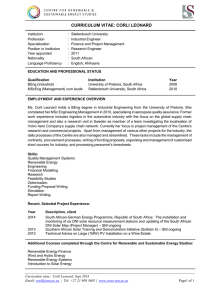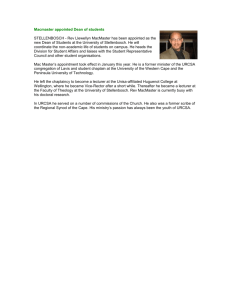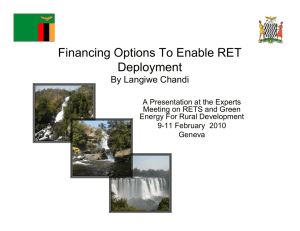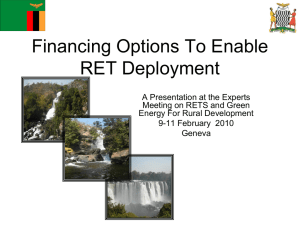Document 10550249
advertisement
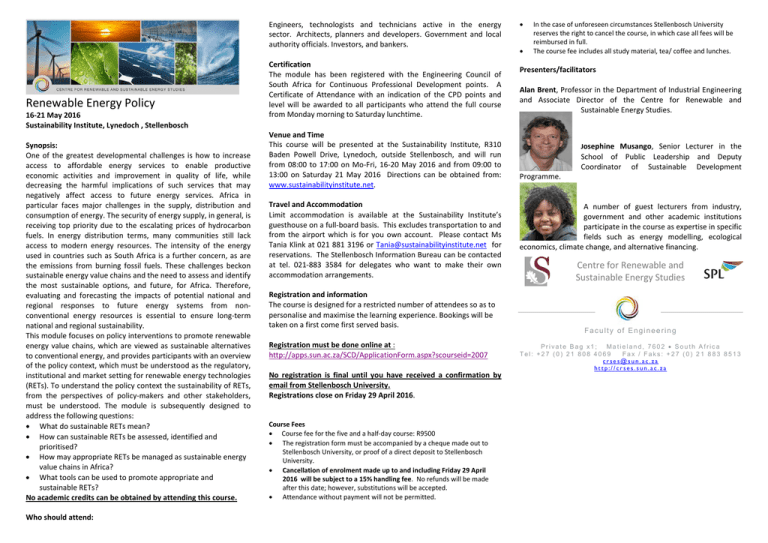
Engineers, technologists and technicians active in the energy sector. Architects, planners and developers. Government and local authority officials. Investors, and bankers. Renewable Energy Policy 16-21 May 2016 Sustainability Institute, Lynedoch , Stellenbosch Synopsis: One of the greatest developmental challenges is how to increase access to affordable energy services to enable productive economic activities and improvement in quality of life, while decreasing the harmful implications of such services that may negatively affect access to future energy services. Africa in particular faces major challenges in the supply, distribution and consumption of energy. The security of energy supply, in general, is receiving top priority due to the escalating prices of hydrocarbon fuels. In energy distribution terms, many communities still lack access to modern energy resources. The intensity of the energy used in countries such as South Africa is a further concern, as are the emissions from burning fossil fuels. These challenges beckon sustainable energy value chains and the need to assess and identify the most sustainable options, and future, for Africa. Therefore, evaluating and forecasting the impacts of potential national and regional responses to future energy systems from nonconventional energy resources is essential to ensure long-term national and regional sustainability. This module focuses on policy interventions to promote renewable energy value chains, which are viewed as sustainable alternatives to conventional energy, and provides participants with an overview of the policy context, which must be understood as the regulatory, institutional and market setting for renewable energy technologies (RETs). To understand the policy context the sustainability of RETs, from the perspectives of policy-makers and other stakeholders, must be understood. The module is subsequently designed to address the following questions: • What do sustainable RETs mean? • How can sustainable RETs be assessed, identified and prioritised? • How may appropriate RETs be managed as sustainable energy value chains in Africa? • What tools can be used to promote appropriate and sustainable RETs? No academic credits can be obtained by attending this course. Who should attend: Certification The module has been registered with the Engineering Council of South Africa for Continuous Professional Development points. A Certificate of Attendance with an indication of the CPD points and level will be awarded to all participants who attend the full course from Monday morning to Saturday lunchtime. Venue and Time This course will be presented at the Sustainability Institute, R310 Baden Powell Drive, Lynedoch, outside Stellenbosch, and will run from 08:00 to 17:00 on Mo-Fri, 16-20 May 2016 and from 09:00 to 13:00 on Saturday 21 May 2016 Directions can be obtained from: www.sustainabilityinstitute.net. Travel and Accommodation Limit accommodation is available at the Sustainability Institute’s guesthouse on a full-board basis. This excludes transportation to and from the airport which is for you own account. Please contact Ms Tania Klink at 021 881 3196 or Tania@sustainabilityinstitute.net for reservations. The Stellenbosch Information Bureau can be contacted at tel. 021-883 3584 for delegates who want to make their own accommodation arrangements. Registration and information The course is designed for a restricted number of attendees so as to personalise and maximise the learning experience. Bookings will be taken on a first come first served basis. Registration must be done online at : http://apps.sun.ac.za/SCD/ApplicationForm.aspx?scourseid=2007 No registration is final until you have received a confirmation by email from Stellenbosch University. Registrations close on Friday 29 April 2016. Course Fees • Course fee for the five and a half-day course: R9500 • The registration form must be accompanied by a cheque made out to Stellenbosch University, or proof of a direct deposit to Stellenbosch University. • Cancellation of enrolment made up to and including Friday 29 April 2016 will be subject to a 15% handling fee. No refunds will be made after this date; however, substitutions will be accepted. • Attendance without payment will not be permitted. • • In the case of unforeseen circumstances Stellenbosch University reserves the right to cancel the course, in which case all fees will be reimbursed in full. The course fee includes all study material, tea/ coffee and lunches. Presenters/facilitators Alan Brent, Professor in the Department of Industrial Engineering and Associate Director of the Centre for Renewable and Sustainable Energy Studies. Josephine Musango, Senior Lecturer in the Programme. School of Public Leadership and Deputy Coordinator of Sustainable Development A number of guest lecturers from industry, government and other academic institutions participate in the course as expertise in specific fields such as energy modelling, ecological economics, climate change, and alternative financing. Centre for Renewable and Sustainable Energy Studies Faculty of Engineering Private Bag x1; Matieland, 7602 • South Africa Tel: +27 (0) 21 808 4069 Fax / Faks: +27 (0) 21 883 8513 crses@sun.ac.za http://crses.sun.ac.za
